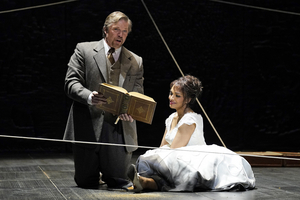Review: EURYDICE at Dorothy Chandler Pavilion

On February 1, 2020, Los Angeles Opera presented the world premiere of Matthew Aucoin's third opera, Eurydice. He composed it together with Sarah Ruhl who wrote the original 2003 play. Aucoin, Ruhl, and this presentation's stage director, Mary Zimmerman, have been the recipients of the MacArthur Fellowships known as "Genius Grants."
Zimmerman set Eurydice's story in modern times and it opens with Orpheus and Eurydice playing beach ball in strong sunlight. Orpheus ties a string around Eurydice's ring finger and she agrees to marry him. Meanwhile in the Underworld, her deceased father writes her a letter that he does not know how to send to earth. Orpheus and his bride dance with amusingly silly motions at their wedding where Eurydice is accosted by Hades. He offers her champagne after telling her he has a letter addressed to her. He never gives her the letter, however, and she falls to her death trying to get it. After she dies, the elevator that takes her down to the Underworld rains forgetfulness upon her.
The guardians of the Underworld are The Stones, Little, Big and Loud who mention that a correct induction into their realm involves washing away all memory. Eurydice loses hers but her father retains some of his memory. When denizens of the Underworld hear Orpheus singing, they begin to awake and it disturbs their rulers.
On Earth, Orpheus mourns Eurydice and manages to get permission for her to follow him back to earth if he never looks at her during the trip. She starts to follow him but something scares her and she calls out to him. He looks at her for one moment and she is lost. Below, her father is desolate at her disappearance and he takes a shower of forgetfulness. On returning to the Underworld, Eurydice writes a letter to Orpheus telling him to marry again. She even tells his eventual new bride how to care for Orpheus before she takes a shower of forgetfulness. Orpheus returns to the Underworld and the elevator that had rained forgetfulness on Eurydice when she first entered it, rains it on him.
Scenic Designer Dan Ostling handled the opera's many scenes with simple box-like settings that could be raised and lowered. The elevator was a cloth box with a commonly seen indicator that told its stops. When Eurydice dies, she is whisked down to the Underworld together with the entire floorcloth in a mini-second.
Ana Kuzmanić's designs for Eurydice were mid calf length dresses with heavy crinoline underpinning. Hades first appeared in a business suit, then in two different long coats, always with a red tail.He walked on stilts in his last scene. His minions wore red and black. Orpheus was clad in simple dark pants and light shirts. The Stones seemed rock-like in stiff gray outfits and gray makeup. Director Zimmerman allowed her singing to actors fully inhabit their characters and the result was most engaging. Even Hades on stilts was a credible personality in this show.
Aucoin's conducting conveyed the textural intricacy and restless quality of his score while driving the drama forward to a variation on the expected conclusion. His music is full of bits and pieces that relate to or were inspired by various earlier composers, but Aucoin's skills are prodigious and what he writes is his own, always new and definitely original. I was particularly enamored of the plaintive passages he wrote for the leading characters that always allowed the singers' words to be clearly understood.
Danielle De Niese was a perky Eurydice who could have been any young bride expecting to be the center of attention at her wedding. Her character never expected to die that day and when she arrived in the Underworld she was completely out of her element. She sang with pristine diction and strong tones that pierced Aucoin's often dissonant orchestra.
Baritone Joshua Hopkins was an Orpheus who looked inward to find his artistic center. Although he loved Eurydice, she had to share him with the music he heard in his head. Thus, he sang with his Double, countertenor John Holiday. Their harmony was graceful and elegant. but occasionally soft-edged. Rod Gilfry was a loving father whose golden tones and well thought out gestures hurled the drama toward its inevitable conclusion.
We have often seen tenor Barry Banks as the soprano's lover, but here he was an evil villain from the Underworld. No matter, his laser-sure high notes clearly told his story. The three stones played the part of a Greek chorus in that they commented on the actions of other characters. As Little Stone, Stacy Tappan emitted radiant top notes while Raehann Bryce-Davis sang with mellifluous middle and low tones. As Loud Stone, tenor Kevin Ray sang with stentorian tones. Grant Gershon's chorus sang Aucoin's delightfully edgy harmonies with superb style while wedding guests danced Denis Jones's amusing choreography at the nuptials.
Eurydice was a delightful discovery that will be at the Metropolitan Opera in a forthcoming season. Los Angeles Opera lovers can experience it on February 8, 14, 16, 20, and 23, 2020.
Photos by Cory Weaver for LA <Opera
Reader Reviews
Videos

